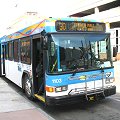- By Patty Poist
- News
 Print
Print  The TCAT, Inc., Board of Directors Thursday night, Dec. 1, approved a nearly $12.8 million bare‑bones spending plan for 2012 along with a stark warning that tougher times lie ahead.
The TCAT, Inc., Board of Directors Thursday night, Dec. 1, approved a nearly $12.8 million bare‑bones spending plan for 2012 along with a stark warning that tougher times lie ahead.The 2012 budget plan includes service reductions and increases in fares that originate in rural areas (Zone 2) outside the Greater Ithaca Area from $1.50 to $2.50.
"For the third straight year in a row – state aid – TCAT’s largest single source of financial support – has been significantly reduced and there is every indication there will be additional cuts in state and federal assistance in 2012 and 2013,” said TCAT Board Chairman Henrik Dullea. “In addition, TCAT’s three local funders, Tompkins County, the City of Ithaca and Cornell University are facing their own financial constraints.”
The 2012 budget includes internal belt‑tightening measures aimed at cutting health care costs, zero or minimal wage increases and hiring freezes. Nonetheless, TCAT in 2012 will still face a $530,000 deficit, which board members described as “unsustainable” going forward.
Dullea and other board members said the budget seriously erodes TCAT’s fund balance, and reduces funding for capital projects needed to adequately serve a community that is increasingly reliant on public transit.
The vote on the service reductions and fare increase come after TCAT held 13 information sessions and one public hearing with the board on Nov. 3. TCAT Board Member David Lieb, a member of the board’s Transit Service Committee, said his committee wrestled over the impact the changes will have on riders.
“We considered the fare proposal extensively, did a lot of soul searching, and after impassioned, empathetic, and well-thought-out discussions over the past couple of months, decided to advise the full board to consider the increase,” Lieb said.
The fare for a trip that originates in Zone 1, traveling to Zone 2, will remain at $1.50. Rural trips at $2.50 inbound and $1.50 outbound, result in $4 round trips, up from the current $3. Lieb said it is important to note that four years ago, rural round trips were reduced from $6 to current levels, so the $4 per round trip remains an “extraordinary value, and among the least expensive travel option for rural commuters.”
“The rural service is the most expensive to run, and we realize its importance. We are well aware that there are transit-dependent riders in these outlying communities that are facing economic challenges; we realize, too, that there are urban residents who face the same challenges,” Lieb said. “We believe it is equitable to charge more for long trips that are costly to run, than for short, highly-efficient trips in the urbanized area.”
Beginning in August, TCAT undertook the process of cutting costs, reducing operating expenses and increasing revenues in order to absorb anticipated budget cuts. TCAT board members and staff presented the proposed budget to TCAT’s three local funders on Aug. 4 that asked for zero increases from them for the fourth year in a row, recognizing that all three are also grappling with a persistently dismal economic climate.
“It was painful and 2013 could be worse; a potential bloodbath,” warned TCAT Board Member and Tompkins County Legislator Frank Proto, who heads the TCAT board’s budget committee. Proto noted that the county recently went through its own painful process in approving its 2012 budget, which included cuts in health and human services programs and the elimination of vacant positions.
To that end, TCAT’s incoming 2012 Board Chairman and County Legislator Pam Mackesey, said her No. 1 priority will be to take a laser‑like approach on finding ways to bolstering TCAT’s financial situation.
“We built this amazing transit system and we can’t let it wither,” Mackesey said.
Mackesey also said it is important for TCAT passengers to begin preparing for another potential across‑the‑board fare increase in 2013 as well as the possibility of more service reductions.
The 2012 service reductions were proposed by TCAT’s Service Development staff, which looked at ways to curb service based on unfunded, poor performing and duplicative routes that would have the least detrimental effect on passengers.
They include:
- discontinuing out‑of‑county service on the Route 52 as Tioga County does not contribute to the service;
- discontinuing the Route 68 as a portion of it duplicates the Route 15 service and there is low ridership on the Route 13/Elmira corridor;
- discontinuing special Tower Road trips on the Route 83;
- combining Routes 53 and 54 in a way that will still enable coverage for the majority of riders.
The vote was unanimous among the seven board members who attended. In addition to Dullea, Lieb, Proto and Mackesey, also voting in favor of the new budget were Kyu‑Jung Whang, Nancy Schuler and Bill Gray. Board members Jennifer Dotson and Kathy Luz Herrera were not in attendance.
The budget becomes effective Jan. 1, and fare increases and service reductions go into effect Jan. 15.
v7i47



